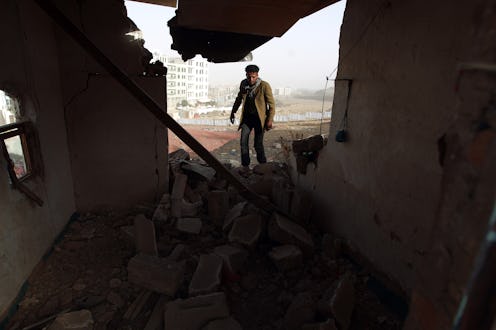News
Yemen Has Fallen To Rebels
With the support of its Gulf region allies, Saudi Arabia launched air strikes in Yemen against Houthi rebels who have taken control of the country on Thursday. The operations aim to counter Iran-allied rebel fighters who have besieged the country for months and have deposed the government that was led by U.S.-backed President Abed Rabbo Mansour Hadi. The conflict has thrown the region into turmoil and put the United States' relationship with the Yemeni government in jeopardy.
Saudi broadcaster al-Arabiya TV has reported that Saudi Arabia plans to contribute as many as 150,000 troops and 100 warplanes to the operations, though there was no confirmation from Riyadh, according to Reuters. Al-Arabiya TV says countries that have contributed planes to the offensive include Egypt, Morocco, Jordan, Sudan, Kuwait, the United Arab Emirates, Qatar, and Bahrain. Egypt, Jordan, Sudan, and Pakistan are also reportedly ready to join ground operations. The Houthis have said they will meet force with force.
Supplied with Iranian money and guns, Yemeni rebel fighters had taken control of the country's northern region, including the capital Sanaa. Forces moved into Aden and occupied its airport on Wednesday. They called for a bounty on Hadi, who had taken refuge in the port city. On Wednesday, Hadi fled Yemen by sea, and the air strikes began hours later.
Though the United States was consulted (most likely for intelligence), the American military is not directly involved in the offensive, National Security Council spokeswoman Bernadette Meehan said in a statement. Saudi Arabia's ambassador to the United States, Adel al-Jubeir, announced the rare coalition military operation at a Washington news conference, saying:
We will do whatever it takes in order to protect the legitimate government of Yemen from falling.
Saudi Arabia, which shares a border with Yemen, views the Houthis as stand-ins for the Iranian government and is afraid of another Shiite-majority country in the region. For the United States, Yemen is the stronghold for an al Qaeda affiliate that's considered one of the militant group's most dangerous branches. The Yemeni government had allowed the United States to launch its own strikes and special operations against al Qaeda members within its borders. Without a U.S.-backed leader in place, that arrangement is likely to cease.
